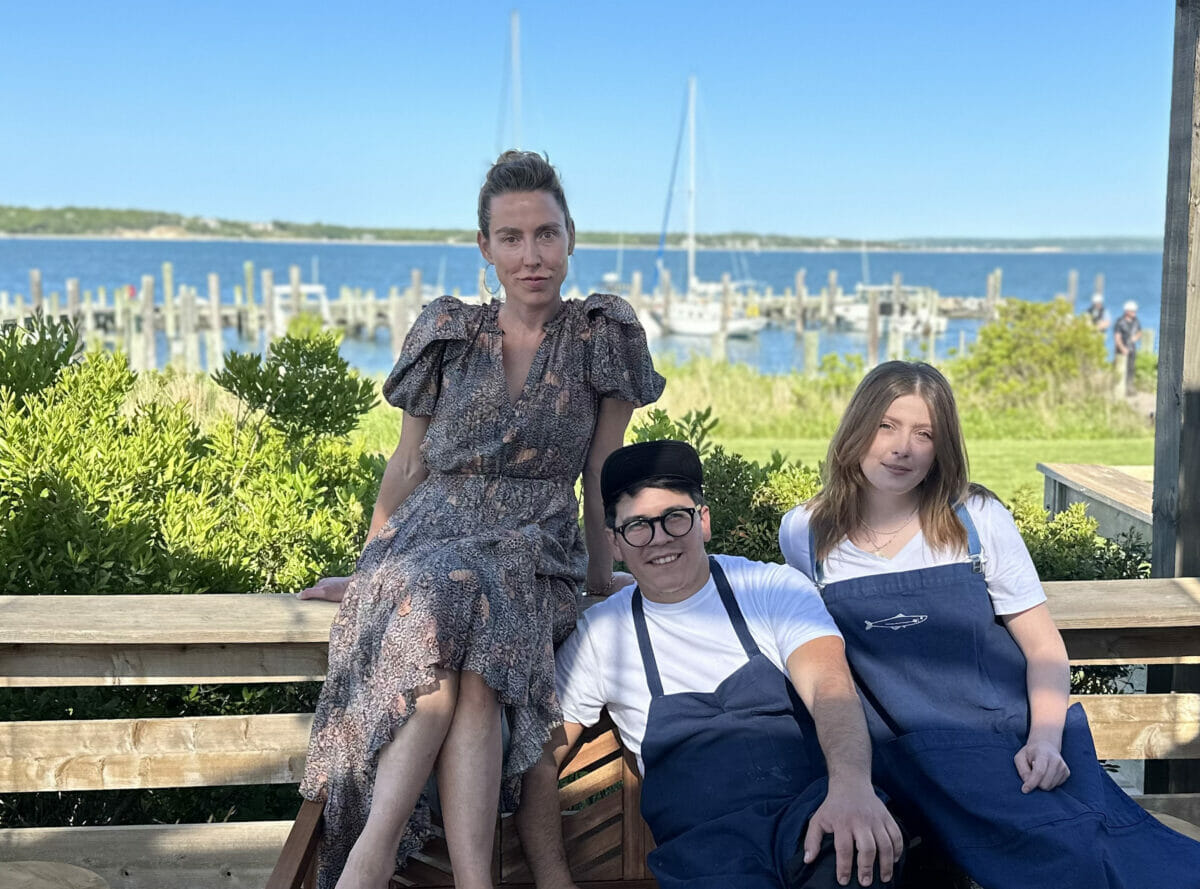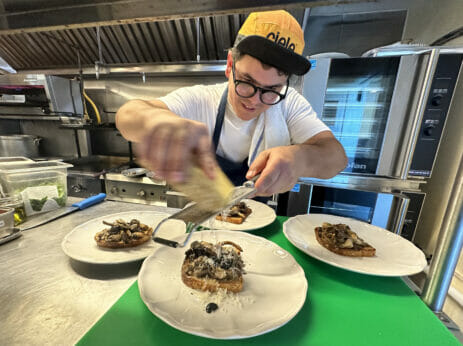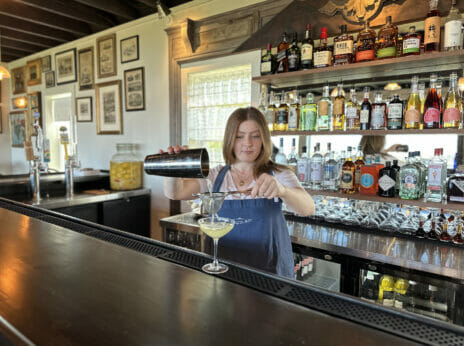Meet the Photographer Turned Seafood Restaurateur Dedicated to Conservation
Andrea Tese grew up fishing with her grandfather. Now, she’s hoping to spread her message of ocean conservancy through, of all things, a seafood restaurant.
Meet the Photographer Turned Seafood Restaurateur Dedicated to Conservation
Andrea Tese grew up fishing with her grandfather. Now, she’s hoping to spread her message of ocean conservancy through, of all things, a seafood restaurant.

Andrea Tese (left), along with chef Cheo Avila and bartender Amanda Akran, at the opening of Minnowby Michelle Colman
Photographer Andrea Tese was always looking for a hook to promote ocean conservancy. Growing up on the North Fork of Long Island, she spent her summers fishing for snapper off a bridge with her grandfather. Tese shared his passion for the ocean. “Ever since I can remember, all I wanted was to be in the water. I would live for family trips to the Caribbean where I got to explore multicolored bustling reefs. Now, they are blanched ghost towns.” Tese has seen the disappearance and drastic shifts across the ocean, and especially close to home. The once-famous Peconic Bay scallops have been nearly decimated in recent years.
As a photographer, Tese has tried to document the changing ocean life, both to preserve a memory of what once was and to bring attention to its rapid decline. In December 2019, after years of trial and error, she finally perfected an innovative 8×10 sheet film camera, designed to take underwater photographs of the Channel Islands’ kelp forests. Tese wanted a unique way to tell the story of the plight of the integral kelp forests. Then, the pandemic struck, the dive boats were docked and her visual storytelling was put on indefinite hold.
That’s when Tese decided to spread her message of ocean conservation another way: through a seafood restaurant.

Yes, it seems unorthodox or even counter-intuitive at first glance, but Tese is approaching the foodservice industry with resolve to shake things up. Minnow will only serve responsibly line or trap caught seasonably available seafood. The restaurant’s motto is: Local. Line caught. Organic. Despite being told by “almost everyone” that her business model is impossible (mostly due to cost and sourcing), Tese is determined to prove them all wrong. “Absolutely no nets, no draggers, trawlers, gill or seine nets,” she vows. “And, absolutely no bykill.”
“Bykill” or “bycatch” are terms used for animals accidentally caught in fishing gear. Nets do not discriminate. Whatever is not intended to be caught is discarded. It is estimated that the U.S. discards two billion pounds of bycatch a year. According to Gen V, “About 40 percent of fish caught worldwide are captured unintentionally and are either thrown back dying or left to die on the boat.” Bycatch can include whales, dolphins, sea turtles, sea birds, coral and sharks. The negative effects of bycatch go far beyond the unnecessary deaths of unintentional catches, disrupting the entire marine ecosystem.
The difficulties of only serving locally sourced, responsibly caught seafood extend beyond trying to find local fishermen in line with Minnow’s mission. Tese continues her extensive research of the fishermen’s methods and also takes into consideration where the fish are processed.
Cognizant of the locals’ way of life, Tese asks detailed questions, such as what kind of lines are used to catch which fish? “Certain fish caught on long lines can be bad depending on where those lines are so they don’t catch the wrong animals,” says Tese.“Golden tilefish can only be caught on long lines, but those lines are very deep down so no other marine animals get caught on them.”
Similarly, she says, the majority of seafood processing plants in the country have closed due to the economic development potential of waterfront property and cheaper offshore options. Even if consumers think they are getting “local” fish, that fish is often frozen, shipped to China for processing, thawed, processed, refrozen and returned. “And,” says Tese, “who is to say that you even get the same fish back?”
Rather than take her chances with foreign processors, Tese is determined to stick with local seafood, and she is pleased with the diversity of options. Her Mediterranean-inspired menu will include golden tilefish, black sea bass, which is plentiful around the North Fork, porgy and raw bar items such as whelks, local lobsters, squid and blue claw crabs, as well as local produce and wine.

Beyond the sustainable menu, Tese aims to use only reusable or returnable glass to-go containers, mismatched thrifted tableware sets and vintage decor reworked by Lumber & Salt from its local salvage yard.
Tese hopes to host fundraising events and talks to benefit her favorite conservancy nonprofits, such as Oceana and Sea Shepherd, at least twice a year. “That is the way I’ll educate people.” However, she has no intention of being heavy handed with her conservation message, as she believes the proof is in the pudding. “If I can prove the model works, it will speak for itself.”
Minnow opened recently on Memorial Day weekend in the waterfront town of New Suffolk.
Follow us
This work is licensed under a Creative Commons Attribution-NoDerivatives 4.0 International License.
Want to republish a Modern Farmer story?
We are happy for Modern Farmer stories to be shared, and encourage you to republish our articles for your audience. When doing so, we ask that you follow these guidelines:
Please credit us and our writers
For the author byline, please use “Author Name, Modern Farmer.” At the top of our stories, if on the web, please include this text and link: “This story was originally published by Modern Farmer.”
Please make sure to include a link back to either our home page or the article URL.
At the bottom of the story, please include the following text:
“Modern Farmer is a nonprofit initiative dedicated to raising awareness and catalyzing action at the intersection of food, agriculture, and society. Read more at <link>Modern Farmer</link>.”
Use our widget
We’d like to be able to track our stories, so we ask that if you republish our content, you do so using our widget (located on the left hand side of the article). The HTML code has a built-in tracker that tells us the data and domain where the story was published, as well as view counts.
Check the image requirements
It’s your responsibility to confirm you're licensed to republish images in our articles. Some images, such as those from commercial providers, don't allow their images to be republished without permission or payment. Copyright terms are generally listed in the image caption and attribution. You are welcome to omit our images or substitute with your own. Charts and interactive graphics follow the same rules.
Don’t change too much. Or, ask us first.
Articles must be republished in their entirety. It’s okay to change references to time (“today” to “yesterday”) or location (“Iowa City, IA” to “here”). But please keep everything else the same.
If you feel strongly that a more material edit needs to be made, get in touch with us at [email protected]. We’re happy to discuss it with the original author, but we must have prior approval for changes before publication.
Special cases
Extracts. You may run the first few lines or paragraphs of the article and then say: “Read the full article at Modern Farmer” with a link back to the original article.
Quotes. You may quote authors provided you include a link back to the article URL.
Translations. These require writer approval. To inquire about translation of a Modern Farmer article, contact us at [email protected]
Signed consent / copyright release forms. These are not required, provided you are following these guidelines.
Print. Articles can be republished in print under these same rules, with the exception that you do not need to include the links.
Tag us
When sharing the story on social media, please tag us using the following: - Twitter (@ModFarm) - Facebook (@ModernFarmerMedia) - Instagram (@modfarm)
Use our content respectfully
Modern Farmer is a nonprofit and as such we share our content for free and in good faith in order to reach new audiences. Respectfully,
No selling ads against our stories. It’s okay to put our stories on pages with ads.
Don’t republish our material wholesale, or automatically; you need to select stories to be republished individually.
You have no rights to sell, license, syndicate, or otherwise represent yourself as the authorized owner of our material to any third parties. This means that you cannot actively publish or submit our work for syndication to third party platforms or apps like Apple News or Google News. We understand that publishers cannot fully control when certain third parties automatically summarize or crawl content from publishers’ own sites.
Keep in touch
We want to hear from you if you love Modern Farmer content, have a collaboration idea, or anything else to share. As a nonprofit outlet, we work in service of our community and are always open to comments, feedback, and ideas. Contact us at [email protected].by Michelle Colman, Modern Farmer
June 2, 2023
Modern Farmer Weekly
Solutions Hub
Innovations, ideas and inspiration. Actionable solutions for a resilient food system.
ExploreExplore other topics
Share With Us
We want to hear from Modern Farmer readers who have thoughtful commentary, actionable solutions, or helpful ideas to share.
SubmitNecessary cookies are absolutely essential for the website to function properly. This category only includes cookies that ensures basic functionalities and security features of the website. These cookies do not store any personal information.
Any cookies that may not be particularly necessary for the website to function and are used specifically to collect user personal data via analytics, ads, other embedded contents are termed as non-necessary cookies.